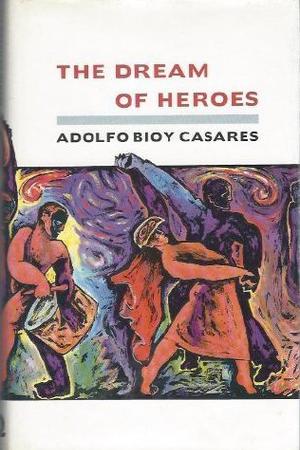The Dream of Heroes by Adolfo Bioy Casares

Adolfo Bioy Casares is perhaps better known for his friendship and collaboration, with in my opinion, the greatest Latin American writer: Jorge Luis Borges. Nevertheless, the universe of his stories shines on its own, and deserves recognition that until now has felt elusive, often overshadowed by Borges himself. I consider The Invention of Morel and The Dream of Heroes as his most accomplished works, bringing together an interesting mix of realism and fantasy.
In The Dream of Heroes, the young Emilio Gauna, the main character, spends three days of revelry with friends during the carnival of 1927. Afterward, he suffers a revelatory and elusive near-death experience, of which he can barely remember anything, but rather a fuzzy, hard-to-reach image of a masked woman in a dancing hall and a knife fight with Dr. Valerga, before finding himself waking up in pain and horrified in the shoreline of a lake. In the aftermath, Emilio becomes obsessed with the events that he cannot fully remember, as his party friends remain elusive or unable to offer any help to rebuild what happened.
Shortly after, Emilio marries Clara, the daughter of the Sorcerer Taboada, and for a while, he manages to push aside his obsession, under the influence of the Sorcerer who suggests that his search could only bring negative consequences. However, after Taboada’s death, the obsession resurfaces, and this time Emilio is determined not to ignore it. Thus, as in a sort of cyclical repetition, Emilio sets out to relive those three days of festivities during Carnival in 1930, where he feels something was lost and remains frustratingly out of reach. He invites his friends and revisits the same places, following the same path he took during that fateful time.
I must now proceed slowly and very carefully. What I have to tell is so strange that if I do not explain it all clearly no one will understand or believe me. Now begins the magical part of this story, or perhaps it has all been magical, only we have failed to perceive its true nature
Unlike other stories by Bioy Casares, the fantastical elements of The Dream of Heroes are subtly concealed, perhaps only becoming evident from the third night of revelry in the repetition of events that Emilio is about to relive. In fact, the author himself is responsible for elucidating the nature of history at the beginning of chapter XLVIII. However, there are earlier moments that hint something escapes reality and intertwines with fantasy. It is striking, for example, that both times, Emilio’s parties began after winning a bet on horse races, a detail that carries a conspicuous weight. The daydreams following the events of the first adventure also convey an eerie sense of strangeness that, while the reader might not consider it fantasy, seems to blur or suggest the presence of the fantastic beneath the surface.
The Dream of Heroes contains elements of a Greek tragedy, where Emilio, relentlessly consumed by his obsessions, cannot escape the pull of his fate, transforming the mystery of his experience into a doomed search for self, as if the very mystery of his experience has been preordained in a world filled with shadows where he himself is a shadow. Despite Clara’s efforts—the personification of love in the novel—he cannot free himself from the events that seem inevitably bound to unfold. She might represent the possibility of escape, but Emilio’s destiny, marked by his obsession and already glimpsed the other side in the 1927, refuses to release its grip on him.
He found he was once again in the dream of the heroes, the dream he had begun the night before
The revelation at the end of The Dream of Heroes presents a moment of surprising clarity for Emilio. Now, self-aware of his courage, realizes with a tranquil sense of fulfillment that “he had been in that place before, at that time, in that clearing, among those trees… he had lived that moment before”. This realization seems to remind us that any destiny is a happy when it has been accepted. Emilio, in this final moment, does not think of Clara, nor does he dwells on any specific event that led him here. Instead, he remembers the moment as a fantasy, a destiny to be fulfilled after resuming it. The acceptance of his fate brings to mind Camus' image of the smiling Sisyphus—an individual who, having accepted his fate, finds meaning and even joy on the repetition of his struggle.